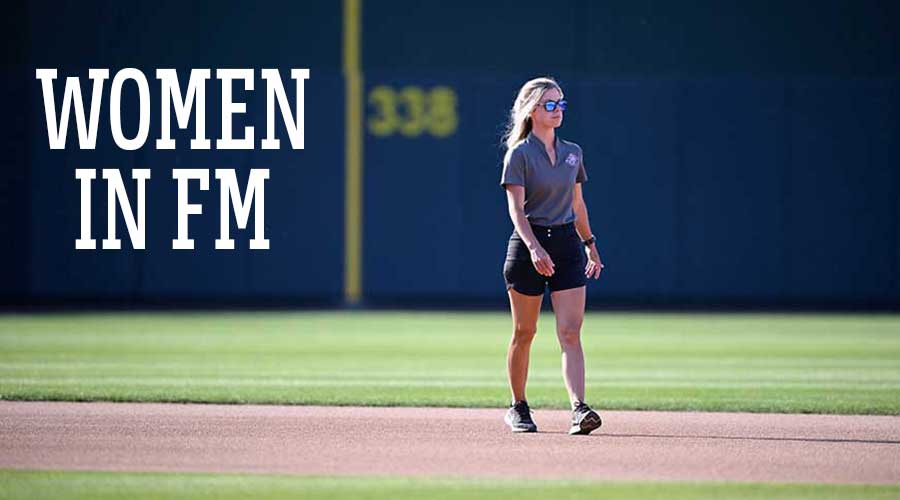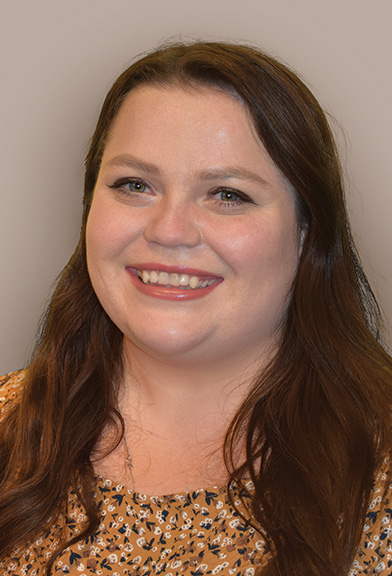When Leah Withrow, head groundskeeper for the Reno Aces (the Triple A affiliate of the Arizona Diamondbacks), was first promoted to her position in 2021 she felt like she didn’t deserve it. She battled her own thoughts on whether or not she was too young and if she was experienced enough to take on the job. If she accepted, she would become the first woman ever in the program’s history to be head groundskeeper — and with her decision came the need to prove naysayers — and sometimes herself — wrong.

“You grow up thinking it’s supposed to be a man until it’s you,” Withrow says. “In every movie and TV show it’s always a guy in a suit that’s the CEO. It’s never a woman. I had to really stop the ‘prove everybody wrong’ mindset and start proving myself right. I did all the things that I was supposed to do. I did the trainings, I took all the certifications, I took the classes. I had to switch my mindset and tell myself that I was on the right path.”
There’s no hiding Withrow’s work. Her input on the field has to be able to speak for itself. If the grass is dying or something looks off, that reflects on her. She aims to make the field look pristine before and after every event that takes place at the stadium.
“I put out a good product every day,” Withrow says. “I put 100 percent in every day. I make sure this field is safe and playable for everybody who wants to come out on to it after a concert, circus or whatever they want to throw out here. Myself and my team bust our butts to make sure you never know another event took place here.”
By continuing to give it her all every day, the Greater Nevada Field was named the 2022 Professional Baseball Field of the Year by Sports Field Management Association. The SFMA Awards committee selected the field based on its quality as impacted by staffing, budget, use, monthly maintenance and visual story documenting the challenges and success throughout the course of the year.
“It’s humbling,” Withrow said while accepting the award. “Being recognized by my peers means the world to me, and this honor has been a career goal since I began working in the industry.”
Taking Chances
Withrow credits her work ethic to being a “two feet in” type of person. This mindset has helped her in her career and allowed her to take chances that other people would have hesitated at. When she was looking to go to college for sports turf grass management, she contacted the Arizona Diamondbacks on their website and asked if she could shadow the head groundskeeper for a day and they said yes.
“To have an 18-year-old girl message a professional baseball team is kind of random for most people,” Withrow says. “I knew I was curious about it and I wanted to be all in.”
Withrow was able to work with the Diamondbacks for two days and after that she knew there was no going back. Because of this experience, she has made an effort to become a mentor to young women that are looking to join the industry.
“On the off chance a young girl who’s really into facilities, sports or some sort of male-dominated industry sees someone like her can make or break that choice for her to move into that field,” Withrow says. “It’s hard to navigate just high school and then everything else that happens after that. I’m just here to help as much as I can.”
Withrow credits Nicole Sherry, head groundskeeper for the Baltimore Orioles, for being a mentor to her when she first started with the Reno Aces.
“Getting to see Nicole growing up made it an easier decision for me to take this job. If she could do it, I could do it,” Withrow says
Still, the sports world is becoming more diversified. Just this past summer, the Little League Softball World Series had its first-ever all-women grounds crew.
“There was five generations of female groundskeepers there,” Withrow says. “It’s really cool progression to actually see. You’re also building these connections with people that you’ve always wanted to talk to but have never gotten the chance. It’s also giving young girls an opportunity to meet five generations worth of groundskeepers and listen to their stories. I would’ve died for this opportunity when I was in high school.”
Going Viral
Still, recruiting more women to join the industry can be a daunting challenge. For Withrow, though, the only way to maintain progress is to keep showing up and taking on these jobs.
“When I first got my promotion to be head groundskeeper I had to do a ton of interviews because, at the time, I was the only female head groundskeeper in all of minor league baseball,” Withrow says. “People wanted to talk about it — which was great, but it stressed me out. I’m such an introvert, and I have this job because I like being behind the scenes. I know that 16-year-old me would’ve really benefited from seeing my interview on TV. The more that I do the more that young girls will see it. The internet is a big place and the algorithm you’re given can either give you a singing cat or it can give you me.”
Withrow has taken to social media to pull back the curtain on grounds management. In her popular TikToks and tweets, she can be seen painting the field, mowing the grass and even chasing an occasional bird or two off the property.
Showing off what grounds management looks like behind the scenes has helped Gen Z grasp that it’s much more than a labor-intensive job, and that there is an actual science behind it.
“People love to know what they don’t know and TikTok is the place to learn about random stuff,” Withrow says. “There’s niche parts of every job, it’s not what you stereotypically think.”
Viewers leave a wide array of comments on Withrow’s videos, but the most often one is “how do I get into this?” Last summer, Withrow was able to hire crewmembers because they found out that she was hiring through her videos.
“You’re able to show people the job and they can decide whether or not they are interested in it,” Withrow says. “But sometimes a video lands on someone who doesn’t like their major [in college] and then the wheels start spinning on how they can do something like this, too.”
For Withrow, though, grounds management and sports have proven to be more inclusive than she would have ever thought — it just took changing her own mindset to be able to see that. While she doesn’t regret working hard to prove that her existence within the industry was on purpose, she wishes she knew that the industry actually accepted her right away instead of rejecting her.
“I have yet to find a reason why women can’t be in this world,” Withrow says. “I can’t think of a single one. The only reason people don’t do it is because they are afraid. Ask the questions, put yourself out there. If this is something that you are passionate about or think you could be really good at it or put out a positive output into the world, then just try it.”









